Related Research Articles

The Malayan Emergency, also known as the Anti–British National Liberation War(1948–1960), was a guerrilla war fought in British Malaya between communist pro-independence fighters of the Malayan National Liberation Army (MNLA) and the military forces of the Federation of Malaya, British Empire and Commonwealth. The communists fought to win independence for Malaya from the British Empire and to establish a socialist economy, while the Malayan Federation and Commonwealth forces fought to combat communism and protect British economic and colonial interests. The term "Emergency" was used by the British to characterise the conflict in order to avoid referring to it as a war, because London-based insurers would not pay out in instances of civil wars.
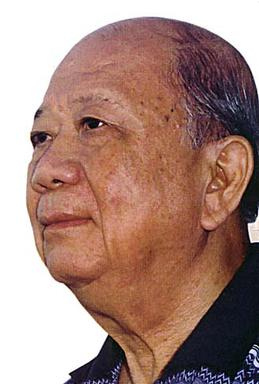
Chin Peng, born Ong Boon Hua, was a Malayan communist guerilla leader and politician, who was the long-time leader of the Malayan Communist Party (MCP) and the Malayan National Liberation Army (MNLA).

The Malayan Communist Party (MCP), officially the Communist Party of Malaya (CPM), was a Marxist–Leninist and anti-imperialist communist party which was active in British Malaya and later, the modern states of Malaysia and Singapore from 1930 to 1989. It was responsible for the creation of both the Malayan Peoples' Anti-Japanese Army and the Malayan National Liberation Army.

The Briggs Plan was a military plan devised by British General Sir Harold Briggs shortly after his appointment in 1950 as Director of Operations during the Malayan Emergency (1948–1960). The plan aimed to defeat the Malayan National Liberation Army by cutting them off from their sources of support amongst the rural population. To achieve this a large programme of forced resettlement of Malayan peasantry was undertaken, under which about 500,000 people were forcibly transferred from their land and moved to concentration camps euphemistically referred to as "new villages".

Malay nationalism refers to the nationalism that focused overwhelmingly on the Malay anticolonial struggle, motivated by the nationalist ideal of creating a Bangsa Melayu. Its central objectives were the advancement and protection of Malayness: religion (Islam), language (Malay), and royalty. Such pre-occupation is a direct response to the European colonial presence and the influx of a foreign migrant population in Malaya since the mid-nineteenth century.

The Malayan National Liberation Army (MNLA), often mistranslated as the Tentera Pembebasan Kebangsaan Malaya, was a communist guerrilla army that fought for Malayan independence from the British Empire during the Malayan Emergency (1948–1960) and later fought against the Malaysian government in the Communist insurgency in Malaysia (1968–1989). Their central committee was a trade union activist known as Chin Peng who had previously been awarded an OBE by the British for waging a guerrilla war against the Japanese occupation of Malaya. Many MNLA fighters were former members of the Malayan Peoples' Anti-Japanese Army (MPAJA) which had been previously trained and funded by the British to fight against Japan during the Second World War.
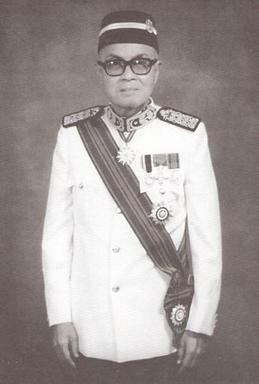
Too Chee Chew (杜志超 M.B.E., better known as C. C. Too, was a major exponent of psychological warfare in Malaysia.

The Communist insurgency in Malaysia, also known as the Second Malayan Emergency, was an armed conflict which occurred in Malaysia from 1968 to 1989, between the Malayan Communist Party (MCP) and Malaysian federal security forces.
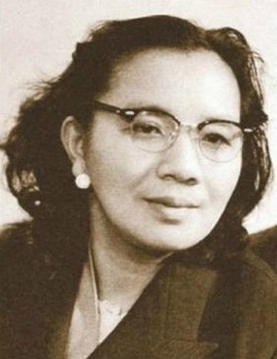
Shamsiah Fakeh was a Malaysian nationalist and feminist. She was the leader of Angkatan Wanita Sedar (AWAS), Malaysia's first nationalist women organisation and a prominent Malay leader of the Communist Party of Malaya (CPM). She was the grandmother of Jamaliah Jamaluddin, Member of the Selangor State Executive Council (EXCO) and Member of the Selangor State Legislative Assembly (MLA) for Bandar Utama.

The Baling Talks were held in northern Malaya on 28 and 29 December 1955 in an attempt to resolve the Malayan Emergency situation.

Lee Meng, also romanised as Lee Min, was a Malaysian Chinese communist guerrilla and a leading member of the Communist Party of Malaya (CPM). She took part in guerrilla resistance against the Japanese occupation of Malaya as a member of the Malayan Peoples' Anti-Japanese Army (MPAJA) and later joined the Malayan National Liberation Army during the Malayan Emergency to fight against British rule in Malaya. She was described as one of the most capable members of the local communist movement, and was also the leader of the "Kepayang Gang" in Perak.
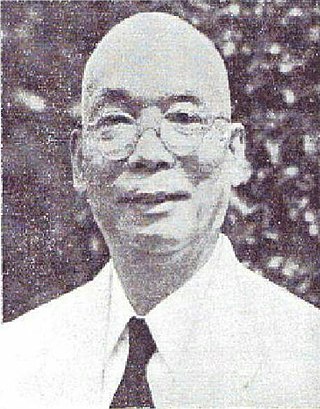
Major General Tun Leong Yew Koh was a Malayan politician who served as the 1st Yang di-Pertua Negeri of Malacca from the independence of the Federation of Malaya in August 1957 to August 1959 and Minister of Health from 1955 to 1956, Minister of Health and Social Welfare from 1956 to 1957 and Minister of Justice from 1959 to his death in January 1963. Being a Kuomintang member himself and serving under the Republic of China government from 1932 and later become the leader of Overseas Chinese Anti-Japanese Army branch in Perak from 1942 until 1945, he is one of the founder of the Malayan Chinese Association (MCA) in 1949 and the party first secretary-general.
Angkatan Wanita Sedar was the first nationalist women's organisation in Malaysia. It was established in 1946 as women's wing of the Malay Nationalist Party. Aishah Ghani was the first president of AWAS. The organisation was also led by Shamsiah Fakeh. At its peak, AWAS had a membership of 2000 women. The group organised, held discussions and hosted Indonesian women visitors. AWAS members, led by Sakinah Junid, participated in a six-mile protest march against the British prohibition disallowing the use of motorised vehicles in processions.

The communist insurgency in Sarawak was an insurgency in Malaysia from 1962 to 1990, and involved the North Kalimantan Communist Party and the Malaysian Government. It was one of the two Communist insurgencies to challenge the former British colony of Malaysia during the Cold War. As with the earlier Malayan Emergency (1948–1960), the Sarawak Communist insurgents were predominantly ethnic Chinese, who opposed British rule over Sarawak and later opposed the merger of the state into the newly created Federation of Malaysia. The insurgency was triggered by the 1962 Brunei Revolt, which had been instigated by the left-wing Brunei People's Party in opposition to the proposed formation of Malaysia.
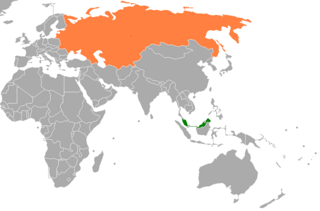
Malaysia–Soviet Union relations refers to the historical relationship between Malaysia and the Soviet Union.

Parti Kebangsaan Melayu Malaya (PKMM), also known as the Malay Nationalist Party, was founded on 17 October 1945 in Ipoh, Perak. The party was the first Malay political party formed after the Japanese occupation of Malaya.
The Malaysian Communist Party (MCP) was a merger of the Communist Party of Malaya/Marxist-Leninist (CPM-ML) and the Communist Party of Malaya/Revolutionary Faction (CPM-RF). Both factions split out from the Malayan Communist Party in the 1970s. MCP traced its roots to splinter groups amongst communist guerrillas in southern Thailand in the 1970s. The party conducted armed struggle in the Malaysian-Thai border areas between 1983 and 1987. The former CPM-RF members lay down their arms on 13 March 1987 and the former CPM-ML members lay down theirs on 28 April 1987. It eventually accepted a deal for cessation of hostilities with the Thai military and its cadres were resettled in 5 'friendship villages'.
The Templer Plan was a political directive which laid out High Commissioner General Gerald Templer’s plan for the political and economic development of Malaya in the 1950s. It was outlined in a fifty-minute speech delivered on 19 March 1952, by General Templer to the Federal Legislative Council of Malaya. The Plan contained eighteen points on various social, economic, and political issues facing Malaya in light of the Malayan Emergency and as the nation prepared itself for self-government and eventually independence from the British. Several of the points were already covered in The Draft Development Plan of the Federation of Malaya 1950–55 which failed to be implemented due to The Malayan Emergency. It would serve as General Templer’s blueprint for governing the country during his two-year tenure as High Commissioner and Director of Operations of Malaya from 1952 to 1954.
Anarchism in Malaysia arose from the revolutionary activities of Chinese immigrants in British Malaya, who were the first to construct an organized anarchist movement in the country - reaching its peak during the 1920s. After a campaign of repression by the British authorities, anarchism was supplanted by Bolshevism as the leading revolutionary current, until the resurgence of the anarchist movement during the 1980s, as part of the Malaysian punk scene.
Alias Chin Peng: My Side of History (2003) is the auto-biography of Malaysian communist leader Chin Peng, the former leader of the Malayan Communist Party who led the Malayan resistance against Japan during World War II, the resistance against the British occupation of Malaya during the Malayan Emergency, and later led communist forces during the Communist insurgency in Malaysia (1968–1989).
References
- ↑ Hack, Karl (2021-12-16). The Malayan Emergency: Revolution and Counterinsurgency at the End of Empire. Cambridge University Press. pp. 175–177. ISBN 978-1-107-08010-2.
- ↑ Chin, Aloysius (1995). The Communist Party of Malaya: The Inside Story. Vinpress. pp. 34–36. ISBN 978-967-81-0192-9.
- ↑ "To exile and back again - the Malaysian Bar".
- ↑ "To exile and back again - the Malaysian Bar".

